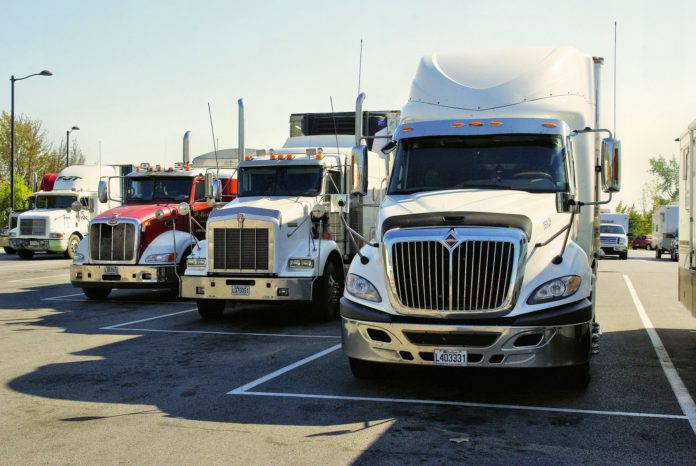
CULLMAN, Ala. – The COVID-19 coronavirus pandemic has proven to be a trialing time for all aspects of the economy and way of life at all levels: federal, state and local. One force that has not slowed down is the trucking industry, which is experiencing a new set of challenges due the pandemic, with trucks hauling retail items or medical supplies at an all-time high rate. For Alabama, drivers are now able operate longer hours due to the hours of service limitation being lifted. Gov. Kay Ivey increased the gross weight limitations from 80,000 pounds to 90,000 pounds, allowing trucks the ability to haul larger loads.
On a local level, trucker John “Huggy Bear” Shofner shared how he and other drivers have been impacted, “We’re definitely having a hard time finding places to eat, places to use the bathroom, places to take a shower, even the truck stops are shutting us down,” Shofner said. “We are the main reason those truck stops are making money and yet, to a degree I understand why they’re doing this, but they need to realize if we can’t continue moving, everything stops. Everything.”
He responded to posts on Facebook supporting truck drivers, “A lot of people are posting on Facebook, ‘Oh do this for them, do that for them, thank you drivers, we appreciate you,’ I mean and it’s nice for people to post that, but of everybody that’s posting, I would be willing to bet that only 10%, if that much, are doing anything to truly help with the problem.”
Shofner continued,
“I load my haul up in Birmingham basically, I can run back to my house and take a shower at the house every other day, if need be, but 90% of your drivers out here can’t. It’s just making it really hard on us, we are expected to continue on with our job out here and that’s fine, I’d be doing it anyway, but it’s hard to do our job when we don’t even have the extreme basic necessities.”
The hours have increased for most drivers, he noted, “It has not affected me because I’m on a dedicated run. Some of our drivers are running more than average, so they’re running 80 to 90 hours a week, based from 70 (hours). If they would let me, I’d run 120 hours a week, I know I could do that safely and still get my sleep. We’ve got some drivers running a bit more, but not much.”
R.E. Garrison Trucking Inc. Vice President of Safety and Driver Relations Shawn Nelson talked about the way they’ve been impacted, “I feel like we’re on the frontline of what’s going on since we haul food products. Our drivers in some locations are having a hard time finding a place to stop the truck and eat, but they’re struggling through.”
He touched on R.E. Garrison’s policies regarding the virus and how they’re aiming to protect drivers from potential exposure, “We put out a statement to our drivers obviously following the CDC standards of being prepared for this and any other sickness as far as that goes, but we are using all kinds of precautions because we haul food products, our drivers have to answer questionnaires when they go into customers’ facilities, whether they’re shippers or receivers, the drivers fill out questionnaires on whether they’ve been exposed to the virus of if they’ve been sick recently and we’re asking our drivers to follow every precaution put forth by the CDC and local health officials as well.”
Nelson confirmed the high demand for food items, noting how heavily the restaurant business has been hit by the current circumstances, “Absolutely, those are essential items, most states are shutting down non-essential businesses, but every state is allowing you to go out and get food. The restaurant industry is very affected right now, obviously, but the retail industry has picked up because of it. Businesses has shifted a little bit from restaurant deliveries to retail deliveries. More people are having to go to grocery stores instead of restaurants.”
Nelson noted what procedures they’re taking to ensure the drivers are well taken care of, “We put out a statement to our people here to stay in contact with our drivers, because drivers get in worry, when they go down the road, they may say ‘We’ve heard some rumors going around that if you go into this state you’re going to be put in quarantine.’ It’s all rumors going around because we’re doing essential movement, our food, everything is for emergency restocking shelves, everything we’re hauling is legal to move around, we’re taking this stuff in to some states that they do have declarations where they’re not allowed to leave their house. Our drivers, they get worried and call in and we talk to them and assure them that it’s legal for them to be there, we have the declaration that they carry in their truck that shows they are legal to be there delivering those products and that they’re able to go out.”
He brought up a special thank you that R.E. Garrison is giving to CDL drivers on the road, “We’re giving free meals to CDL drivers. Tomorrow (Thursday, March 26, 2020) we’ll be at the Gov. Guy Hunt Rest Stop at Mile Marker 299, we’ll also be doing out of our facility on Hwy. 157. We’re just giving out free meals to (CDL) drivers,” Nelson said. “We hand them a brown paper bag that has a hamburger, hotdog and some chips with Milo’s Tea in it. We’re just allowing them to go on up the road, because it’s so hard for them to find a place to stop and eat now. We’re just helping them out and giving them an easy way to get a meal. We’ll being doing it until further notice. We may move around and try to get a location that works for everybody. We’re just trying to help people out; this is just free food.”
What can we do to help the problem?
Shofner answered, “If you see a truck driver parked, take him some snacks. I keep seeing these posts saying, ‘If you see a truck driver go through a fast food line and they get turned away.’ Truly, just drive through the line for them, load them up in your car so they can get to a meal. It’s the restaurants and the truck stops that truly need to change, it’s not so much the general public, it’s the restaurants and the truck stops. They need to address the situation because, and I understand they have to protect themselves, we can’t do our job if we can’t eat, if we don’t have a place to go to the bathroom or take a shower.”
Would it help drivers if everyone stayed home and off the roads?
Shofner said, “Yes and no. It would help because people are still going to need to grocery shop and people are still going to hoard, so we’re going to have to run to make all that up. (On the interstate) I have not seen a change in traffic, at all. None. It’s just as congested as before.”
Like industries, schools, churches and everything in between, the trucking business has not gone unaffected by the COVID-19 pandemic.
Copyright 2020 Humble Roots, LLC. All Rights Reserved.




















